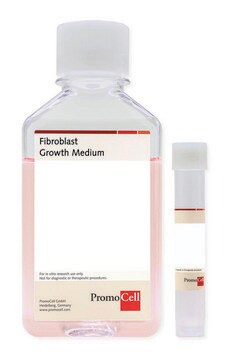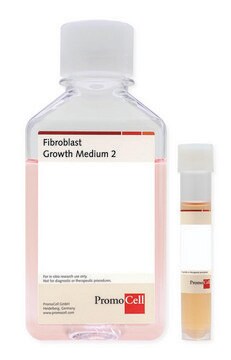Recommended Products
biological source
human neonatal foreskin or adult skin (normal)
Quality Level
packaging
pkg of 500,000 cells
manufacturer/tradename
Cell Applications, Inc
growth mode
Adherent
karyotype
2n = 46
morphology
Fibroblast
technique(s)
cell culture | mammalian: suitable
shipped in
dry ice
storage temp.
−196°C
General description
Lot specific orders are not able to be placed through the web. Contact your local sales rep for more details.
Dermal Fibroblasts are responsible for producing the extracellular matrix forming the connective tissue of the skin, and play a crucial role during wound healing. HDF provide an excellent model system to study many aspects of cell physiology, and have been utilized in dozens of research publications, particularly those related to skin biology and reprogramming/induced pluripotency studies. HDF were used to create, along with human synovyocytes, induced pluripotent stem cells (iPSC) by using the now classic “Yamanaka cocktail” of Oct3/4, Sox2, Klf4, and c-Myc, the discovery for which Dr. Shinya Yamanaka was awarded the Nobel Prize in 2012 (Takanashi, 2007; 2009), and to characterize iPSC general properties, miRNA expression profiles and differentiation potential (Hayashi, 2010; Ohta, 2011; Koyanagi-Aoi, 2013; Noguchi, 20130; Razak, 2013; Sakurai, 2013; Tanaka, 2013; Yanagida, 2013)
Dermal Fibroblasts are responsible for producing the extracellular matrix forming the connective tissue of the skin, and play a crucial role during wound healing. HDF provide an excellent model system to study many aspects of cell physiology, and have been utilized in dozens of research publications, particularly those related to skin biology and reprogramming/induced pluripotency studies. HDF were used to create, along with human synovyocytes, induced pluripotent stem cells (iPSC) by using the now classic “Yamanaka cocktail” of Oct3/4, Sox2, Klf4, and c-Myc, the discovery for which Dr. Shinya Yamanaka was awarded the Nobel Prize in 2012 (Takanashi, 2007; 2009), and to characterize iPSC general properties, miRNA expression profiles and differentiation potential (Hayashi, 2010; Ohta, 2011; Koyanagi-Aoi, 2013; Noguchi, 20130; Razak, 2013; Sakurai, 2013; Tanaka, 2013; Yanagida, 2013)
Cell Line Origin
Skin
Application
injury recovery, connective tissue research, laminin and fibronectin production, extracellular matrix, tissue organization, wound healing, fibroblasts growth factor response
Components
Fibroblast Basal Medium containing 10% FBS & 10% DMSO
Preparation Note
- Primary culture, >500,000 cells in Fibroblast Basal Medium containing 10% FBS & 10% DMSO
- Can be cultured at least 16 doublings
Subculture Routine
Please refer to the HDF Culture Protocol.
Disclaimer
RESEARCH USE ONLY. This product is regulated in France when intended to be used for scientific purposes, including for import and export activities (Article L 1211-1 paragraph 2 of the Public Health Code). The purchaser (i.e. enduser) is required to obtain an import authorization from the France Ministry of Research referred in the Article L1245-5-1 II. of Public Health Code. By ordering this product, you are confirming that you have obtained the proper import authorization.
Storage Class Code
11 - Combustible Solids
WGK
WGK 3
Flash Point(F)
Not applicable
Flash Point(C)
Not applicable
Certificates of Analysis (COA)
Search for Certificates of Analysis (COA) by entering the products Lot/Batch Number. Lot and Batch Numbers can be found on a product’s label following the words ‘Lot’ or ‘Batch’.
Already Own This Product?
Find documentation for the products that you have recently purchased in the Document Library.
Protocols
Storage - Preparation for Culturing - Culturing HDF - Subculturing HDF
Our team of scientists has experience in all areas of research including Life Science, Material Science, Chemical Synthesis, Chromatography, Analytical and many others.
Contact Technical Service






